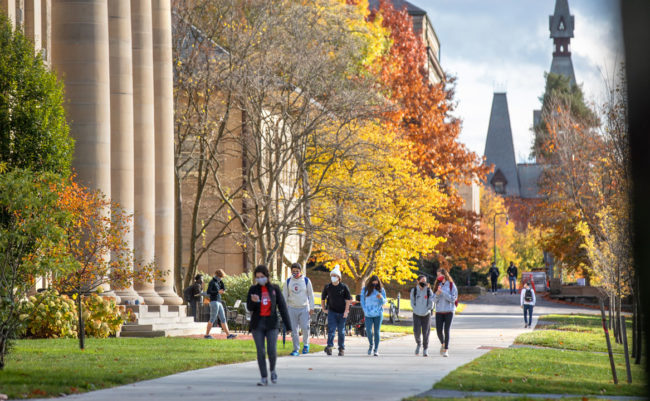
The Problems with Student Debt Forgiveness
One of the most intriguing ideas floating around Washington these days is student debt forgiveness. Some politicians are arguing that the U.S. should forgive $50,000 of student debt per person. Other people think it would be better to forgive all the debt. It might be possible for Joe Biden to make such a move because the U.S. government holds many of the loans.
The Appeal
Student debt forgiveness is a simple and appealing idea. It is exceptionally attractive to people with loans: perhaps the debt will just go away! That would be great!
There are other benefits for debt forgiveness. It removes a burden from young people. It allows people to buy houses, make smart career decisions and start families. Removing the debt could jump-start the economy, too.
The Problems
Unfortunately, student debt forgiveness is a problematic idea, and Joe Biden should be very cautious about moving forward.
The first problem is that forgiving debt raises questions of fairness. We know that humans value the idea of fairness to an extraordinary degree. Even babies recognize the concept. It bothers people deeply if it seems that people are being treated in an unfair way.
To many people, forgiving debt seems unfair. Why should someone who agreed to take on debt receive support, while someone who did not take on debt receives nothing? Some people choose inexpensive schools, others work through college. Many people have made major sacrifices to pay down their debt. Dave Ramsey, for example, has been telling people for years to eat rice and beans while working to become debt free. Why should all these people get no support, while people who decided to take on debt and then did not pay it back receive a windfall?
Blanket debt forgiveness creates additional fairness questions because many wealthy people will benefit from the policy. Should people working at McKinsey making over $200,000 a year receive debt forgiveness? These people took on debt, received a quality education, secured a wonderful job, are making big bucks, and can pay back the loan.
Another issue is that forgiving debt sends the wrong message; it encourages people to take on debt, because the loans might be forgiven someday. Right now, some people have stopped making payments on student loans because there is a chance the loans will be forgiven. Why pay down a loan that might just go away? The idea of forgiveness does not encourage prudent financial management.
Perhaps the biggest problem is that debt forgiveness won’t address the basic problem: education is exceptionally expensive, and some people are taking on too much debt to pay for it. Fixing that problem should be the priority.
Joe Biden could forgive all student loans today, but that won’t stop people from taking on additional debt tomorrow. Education would remain expensive. In some ways, the pressure on colleges to limit tuition hikes would diminish.
A Compromise
In so many ways, debt forgiveness is a massive problem. A small bit of debt forgiveness, limited just to people with lower incomes, might be a reasonable compromise: a modest symbolic step that would help people who need it most.
The more important task: helping people make informed decisions when it comes to paying for education. Transparency on net costs and future income prospects might encourage people to consider both the opportunities and costs.
I think you picked the wrong hill to stand on. You work at one of the most expensive degree factories in the country and I’m quite sure you’re well compensated for your services. There are thousands, and likely millions of kids who see college as the way out of the hole they were born in. They’ve been used and taken advantage of by the institutions who originate these loans. The system needs to be fixed. No need to come out of college with loans that are as big as a mortgage. If a few McKinsey kids benefit, so be it. The vast majority need the help.
Forgiveness based on income? What if it is a wealthy family that figured borrowing cheaply was a good deal, but there is massive wealth? What if modest for a year (an internship) but next year is off to McKinsey? What about medical interns with huge lifetime earnings, just not this first year. Etc.
Transparency in pricing is a very good idea. Students will still susceptible to the influence of marketing and advertising by colleges, but it’s the right first step.
Vast sums of money. Alternatively provide more support to state schools so they can lower tuition and maybe to privates strictly for scholarships.
Tim, I dont think your views are balanced. You obviously are being paid by these loans. The money has been given to your university and more loans means more pay. The real problem here is the outrageous and spiraling upward of tuitions. They exceed just about every other cost and force young people n their families to take on debt they should not and quite frankly are not worth the return. How bout lowering tuitions to bring them back in line with realistic pricing of goods and services. Maybe use some of the massive endowments to forgive some debt. Putting young people over a financial debt barrel is not in the long n shot term interest of any of the stakeholders. I say we encourage young people to attend state n community colleges and skip the bloated , overpriced northwesterns of the country. Yeah the buildings n food are banging, but is it really worth it? Nah. Probably the most overpriced object you can purchase.
Love your blog for the most part, just not this one.
In addition to income limits forgiveness should include those who are in the “helping” professions, I.e., social workers, teachers, etc. to encourage such pursuits